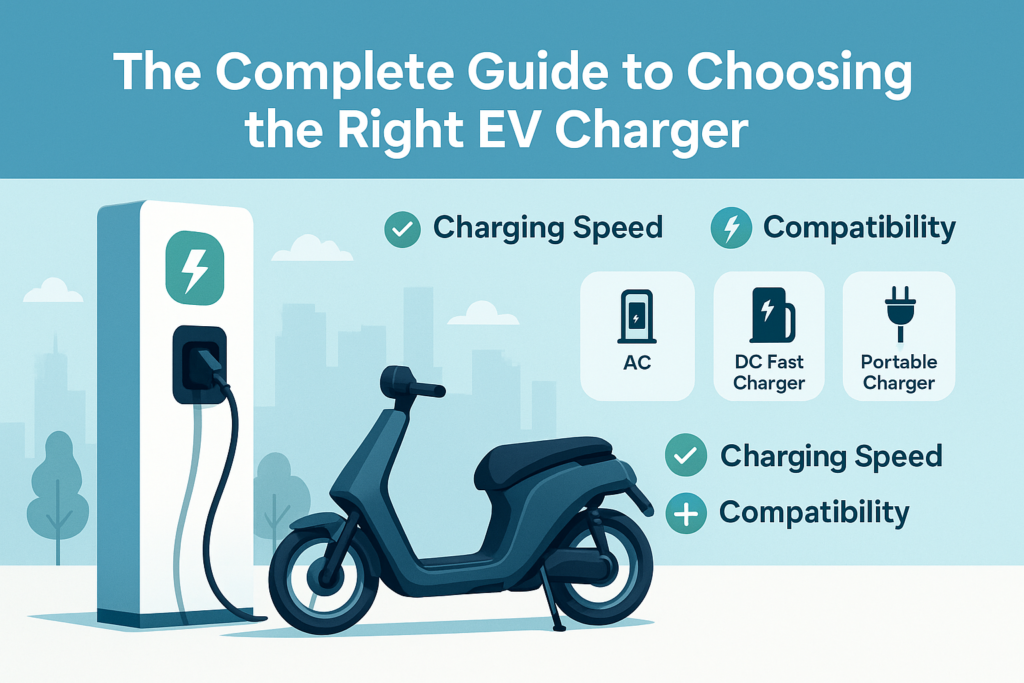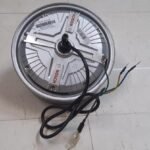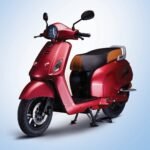
Whether you’re riding a stylish electric scooter or managing a delivery fleet of EV bikes, your ride is only as good as your charger. A bad charger can shorten battery life, overheat your system, or leave you stranded. Choosing the right EV charger is not just a matter of convenience — it’s essential for performance, safety, and long-term savings.
In this guide, we’ll walk you through everything you need to know before buying an EV charger in India, including:
- Types of EV chargers
- Voltage and amp compatibility
- Charging time estimates
- Fast charging vs regular charging
- Tips to extend battery life
- Where to buy trusted EV chargers online
What Is an EV Charger?
An EV charger is a device that replenishes energy in your battery by converting AC power from your wall socket into the DC power your battery needs. For scooters and bikes, it typically connects via a 3-pin or 2-pin socket.
A good charger:
- Matches your battery’s voltage and capacity
- Provides steady and safe current
- Includes overcharge and thermal protection
- Is compatible with lithium-ion, lead-acid, or LiFePO4 batteries
Why Choosing the Right Charger Matters
Wrong charger = damaged battery
Using the wrong voltage or current level can lead to:
- Overheating
- Swollen batteries
- Reduced charge cycles
- Permanent battery damage
Right charger = long life + better performance
With the right charger, you’ll enjoy:
- Faster yet safe charging
- Extended battery health
- Optimized range per charge
- Peace of mind on every ride
Types of EV Chargers for Two-Wheelers
- Lead-Acid Battery Chargers
- Low cost
- Long charging time (6–8 hrs)
- Requires water refilling maintenance
- Suitable for older scooters or budget EVs
- Low cost
- Lithium-Ion Battery Chargers
- Modern, faster charging (3–5 hrs)
- Lightweight, auto cut-off
- Used in most EV scooters today
Example: Lithium Battery Charger – 48V/60V/72V
- Modern, faster charging (3–5 hrs)
- Smart Chargers
- Auto voltage detection
- Overcharge protection
- LED display for charging status
- Some support USB output or solar input
- Auto voltage detection
- Fast Chargers (Limited to some EVs)
- 2–3x faster than regular chargers
- May need special connector and controller
- Ideal for fleet or commercial EVs
- 2–3x faster than regular chargers
Understand Battery & Charger Compatibility
Before you order, always check these 3 things:
1. Battery Voltage
Most common options:
- 48V (city scooters, budget EVs)
- 60V (performance or delivery EVs)
- 72V (long-range, high-speed EVs)
Your charger should exactly match your battery voltage.
2. Battery Type
Chargers are NOT universal. They’re designed for:
- Lithium-ion (Li-ion)
- Lithium Phosphate (LiFePO4)
- Lead-acid
Never use a lead-acid charger for lithium batteries and vice versa.
3. Ampere Output
This affects charging speed:
- 3A to 5A → standard charging
- 6A to 10A → fast charging
Higher amps = faster charging but also more heat. Match with your BMS (Battery Management System) specs.
Charging Time Table (Estimated)
| Battery Voltage | Capacity (Ah) | Charger Output | Time Required |
| 48V | 20Ah | 3A | ~6–7 hrs |
| 60V | 24Ah | 5A | ~5 hrs |
| 72V | 30Ah | 6A | ~4–5 hrs |
Note: Times may vary based on temperature, charger quality, and battery condition.
Features to Look for in a Good Charger
- Auto cut-off on full charge
- Overvoltage and short circuit protection
- Thermal shutdown to avoid overheating
- LED indicators (charging/charged/fault)
- Lightweight, compact body
- ISI or CE certification
Tips to Extend Your Battery and Charger Life
- Charge only with the correct voltage and amp rating
- Don’t keep the charger connected overnight unnecessarily
- Keep charger away from water and direct sunlight
- Use a surge protector with your charger at home
- Don’t charge right after a long ride — let the battery cool first
- Avoid draining battery below 20% before charging
Recommended EV Chargers You Can Buy in India
Here are some best-selling and affordable chargers available on ElectricScootersParts.in
48V 3A Lithium Charger
- Compact & durable
- Auto cut-off
- Ideal for everyday city riders
Buy Here
60V 5A Lithium Fast Charger
- Fast charging
- Smart LED indicator
- Great for delivery scooters
Shop Now
Lead-Acid 48V Charger
- Affordable & basic
- Compatible with older Hero, Yo Bikes, etc.
Check Options
Frequently Asked Questions (FAQ)
Q1. Can I use a higher amp charger for faster charging?
Yes, but it must match your battery’s BMS and connector specs. Too high amps may cause overheating.
Q2. Are EV chargers waterproof?
Most basic models are not. Keep them indoors or in dry areas while charging.
Q3. Can I use a universal charger?
Avoid so-called “universal” chargers unless they are certified for your battery voltage and type.
Q4. How much does a good charger cost?
₹800 to ₹3000, depending on voltage, output, and features.
Warning Signs of a Bad or Failing Charger
- Charger gets abnormally hot
- Takes too long to charge battery
- LED indicators don’t work properly
- Charger cuts off randomly
- Battery swells or loses range quickly
If you experience any of these, replace your charger immediately to avoid battery damage.
Final Checklist Before Buying
- Confirm battery voltage (48V, 60V, 72V)
- Know your battery type (Li-ion, Lead-acid, LiFePO4)
- Pick amp output based on desired speed of charge
- Choose brands with overcharge protection
- Prefer sellers with return policy and warranty
Final Thoughts
A good EV charger ensures your scooter or bike charges safely, quickly, and efficiently. It may not seem like the most exciting purchase — but it directly affects your battery’s health, performance, and long-term costs.
Don’t cut corners. Choose a charger that matches your EV’s battery specs and is built for Indian road and weather conditions. Your battery (and wallet) will thank you.
Ready to buy?
Explore the best EV chargers here





